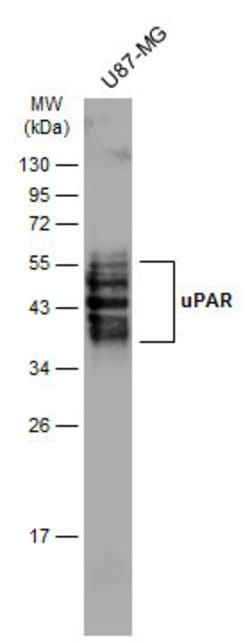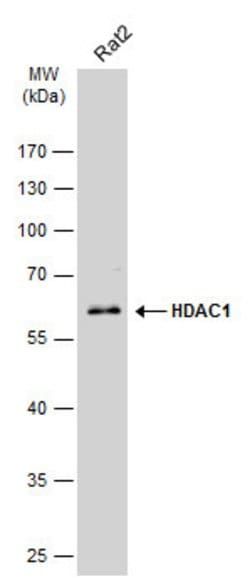uPAR Polyclonal Antibody, Invitrogen™
Manufacturer: Thermo Scientific
Select a Size
| Pack Size | SKU | Availability | Price |
|---|---|---|---|
| Each of 1 | PIPA585092-Each-of-1 | In Stock | ₹ 46,413.50 |
PIPA585092 - Each of 1
In Stock
Quantity
1
Base Price: ₹ 46,413.50
GST (18%): ₹ 8,354.43
Total Price: ₹ 54,767.93
Antigen
uPAR
Classification
Polyclonal
Conjugate
Unconjugated
Gene
PLAUR
Gene Alias
Cd87, MO3, Monocyte activation antigen Mo3, Par, plasminogen activator urokinase receptor 3, plasminogen activator, urokinase receptor, PLAUR, Plaur3, sCD87, soluble CD87, uPAR, U-PAR, uPAR-2, uPAR-3, u-plasminogen activator receptor form 2, urinary plasminogen activator receptor 2, urinary plasminogen activator receptor 3, URKR, urokinase plasminogen activator receptor, urokinase plasminogen activator surface receptor, urokinase-type plasminogen activator (uPA) receptor, urokinase-type plasminogen activator receptor
Host Species
Rabbit
Purification Method
Antigen affinity chromatography
Regulatory Status
RUO
Gene ID (Entrez)
5329
Content And Storage
Store at 4°C short term. For long term storage, store at -20°C, avoiding freeze/thaw cycles.
Form
Liquid
Applications
Immunocytochemistry, Immunohistochemistry (Paraffin), Western Blot, Western Blot
Concentration
0.34 mg/mL
Formulation
PBS with 1% BSA, 20% glycerol and 0.025% ProClin 300, pH 7
Gene Accession No.
Q03405
Gene Symbols
PLAUR
Immunogen
Recombinant protein encompassing a sequence within the center region of human uPAR.
Quantity
100 μL
Primary or Secondary
Primary
Target Species
Human
Product Type
Antibody
Isotype
IgG
Description
- Keep as concentrated solution
- Predicted reactivity: Chimpanzee (100%)
- Positive Control: HeLa, U87-MG
- Store product as a concentrated solution
- Centrifuge briefly prior to opening the vial
- The urokinase-type plasminogen activator receptor is a key molecule in the regulation of cell-surface plasminogen activation and plays an important role in many normal as well as pathologic processes
- The human PLAUR cDNA encodes 335 amino acids including a predicted signal peptide of 22 residues and a hydrophobic C-terminal portion
- It produces a highly glycosylated protein of about 50 kD in monocytes where it is anchored to the plasma membrane by glycosyl-phosphatidylinositol linkage
- PLAUR, also known as UPAR, is directly associated with the carbohydrate-binding domain of SELL in the membrane of neutrophils, an association analogous to that between PLAUR and beta-2 integrins
- PLAUR-mediated calcium mobilization is SELL dependent
- UPAR mRNA levels correlate with the invasive potential of endometrial carcinomas and show a 33-fold increase in UPAR mRNA levels in advanced clinical stage endometrial tumors compared with normal endometrial tissue
- Furthermore, the increase in UPAR mRNA levels correlated linearly with the progression of disease stage
- UPAR protein expressioin correlated positively with rate of recurrence and mortality in patients with endometrial cancer
- UPAR appears to be a useful prognostic marker for advanced endometrial cancer.



